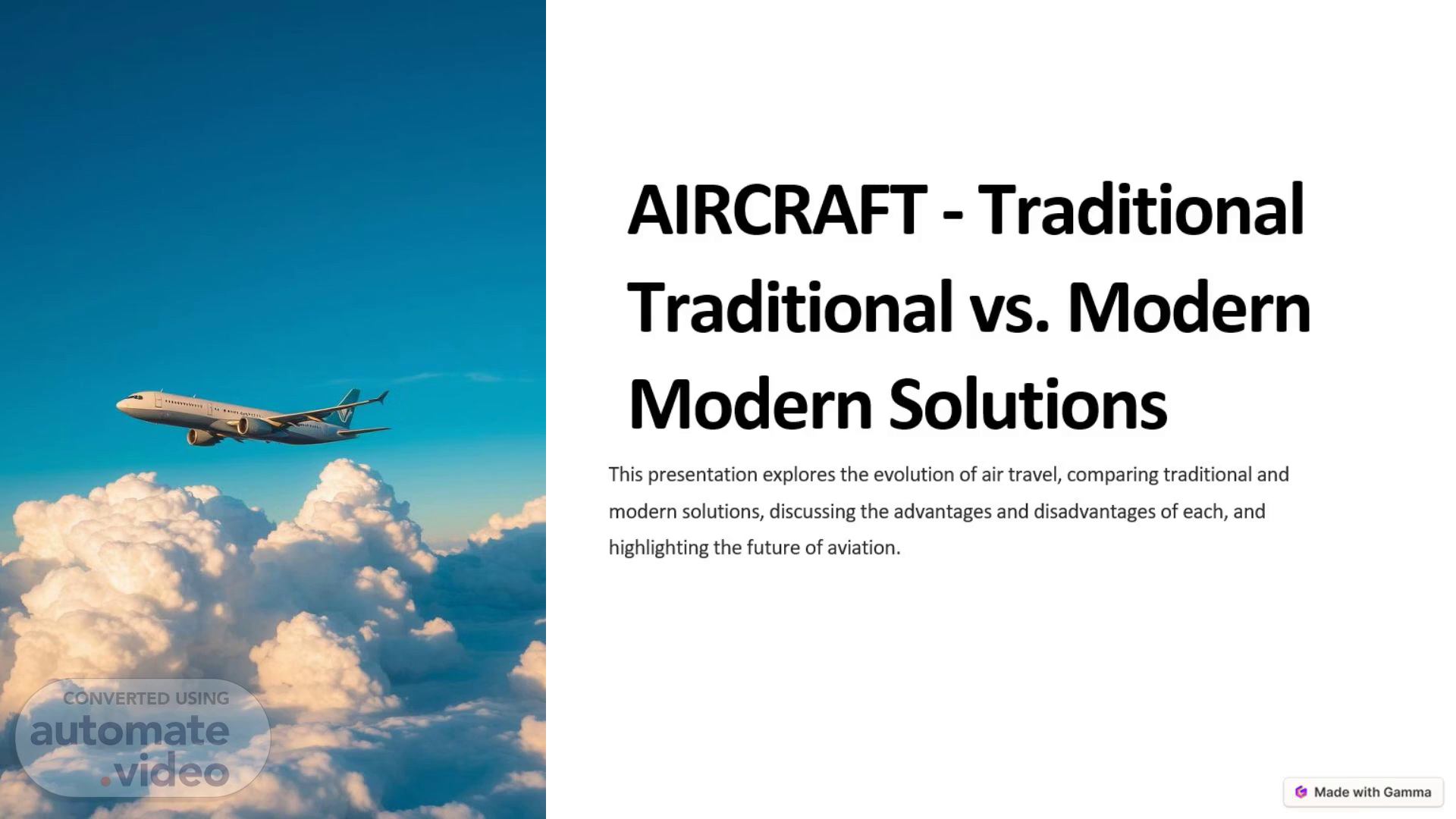Scene 1 (0s)
[Audio] Morning to one and all watching this video Today I am going to present about the planes This presentation explores the evolution of air travel, comparing traditional and modern solutions, discussing the advantages and disadvantages of each, and highlighting the future of aviation..
Scene 2 (18s)
[Audio] Advantages of traditional planes Established Infrastructure Extensive network of airports and maintenance facilities, providing a well-established framework for operation. Proven Technology Years of research and development have resulted in reliable and efficient engines and airframes. Cost-Effectiveness Traditional planes are often more affordable to operate and maintain compared to newer technologies..
Scene 3 (43s)
[Audio] Traditional Planes: Disadvantages Fuel Consumption Traditional planes rely on fossil fuels, leading to high carbon emissions and contributing to climate change. Noise Pollution The engines of traditional planes generate significant noise, impacting communities near airports. Limited Efficiency Traditional planes are less fuel-efficient than newer technologies, resulting in higher operating costs..
Scene 4 (1m 12s)
[Audio] Environmental Impact of Traditional Planes Carbon Emissions Aviation contributes significantly to greenhouse gas emissions, accelerating climate change. Noise Pollution Aircraft noise impacts wildlife and human communities near airports, disrupting ecosystems and affecting well-being. Air Quality Emissions from aircraft engines contribute to air pollution, harming human health and the environment..
Scene 5 (1m 40s)
[Audio] Reliability and Safety Concerns Mechanical Failures Traditional planes are complex machines with numerous components that can malfunction. Human Error Pilot fatigue, miscommunication, and decision-making errors can lead to accidents. Weather Conditions Turbulence, storms, and other weather events can pose significant risks to air travel..
Scene 6 (2m 4s)
[Audio] Emerging Technologies in Aviation Hybrid Propulsion Combining traditional jet engines with electric motors for increased fuel efficiency and reduced emissions. Electric Aircraft Fully electric aircraft powered by batteries, offering zero-emission flight and quiet operation. Autonomous Flight Developing AI-powered systems for autonomous aircraft navigation, enhancing safety and efficiency..
Scene 7 (2m 35s)
[Audio] Hybrid and Electric Plane Solutions Advantages & disadvantage.
Scene 8 (2m 53s)
[Audio] The Future of Air Travel Sustainable Aviation Focus on reducing environmental impact through fuel-efficient aircraft and alternative propulsion systems. Faster Travel Times Advances in technology and infrastructure enable quicker journeys and more efficient routes. Enhanced Passenger Experience More comfortable and personalized experiences with advanced cabin amenities and personalized services. Increased Accessibility Expanding air travel to underserved regions through innovative aircraft designs and infrastructure..
Scene 9 (3m 30s)
[Audio] Conclusion and Key Takeaways The future of air travel is marked by innovation and sustainability. While traditional planes offer proven technology and infrastructure, emerging technologies like hybrid and electric planes offer a more sustainable and efficient approach. The industry is evolving towards a future of clean and accessible air travel, shaping the way we connect and explore the world..
Scene 10 (3m 55s)
[Audio] Thank you. Thank You.
